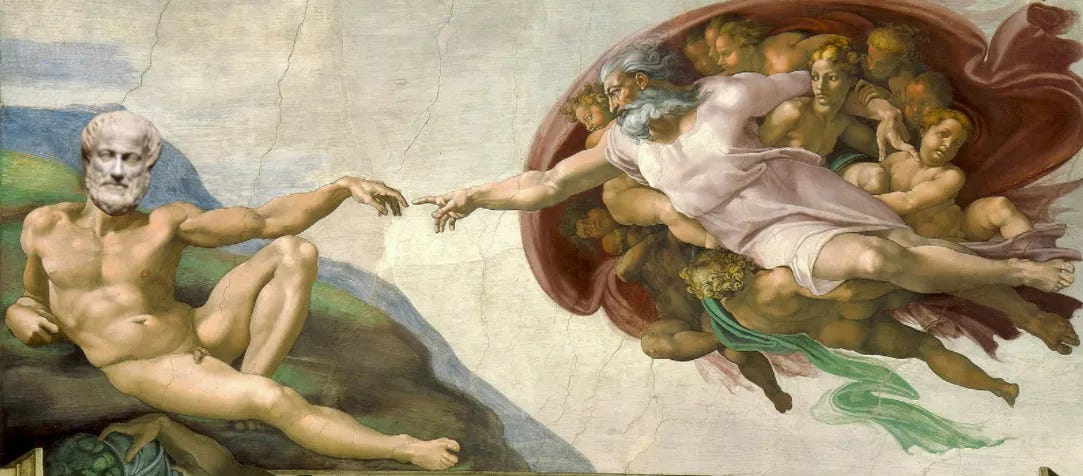Atheism Is Religion For Flat-Earthers
What do you believe in when you claim not to believe in anything?
Note: article first published at Newsmax, exceptionally adapted and expanded below.
I’m a Creationist. Like, an old-style Creationist. None of that new-age ‘Intelligent Design’ for me. I truly believe that, at some point, likely around 27 billion years ago, God literally clicked His fingers and created the universe. To me, the Big Bang was God clicking His fingers.
My fundamental belief in Creationism isn’t based on Genesis, though, but on Aristotle, the father of Western monotheism. In his 322 BC Metaphysics, the Philosopher proposed the concept of an ‘unmoved mover’: everything in motion was set in motion by something else; if A is in motion, there must be a B that set A in motion, and so forth. This series must halt at an X — an unmoved mover, a primary cause, the creator of all motion in the universe. Aristotle named this X ‘God,’ describing Him as perfectly beautiful, indivisible, and engaged in the perfect contemplation: self-contemplation.
The ‘unmoved mover’ has since been identified with the Judeo-Christian God by thinkers like St. Thomas Aquinas and Maimonides. This is the God that caused the universe, created life, and provides humans with purpose. The God who offers atheists something to disbelieve in.
But what do atheists believe in if they claim not to believe in God? The logical opposite: the universe is eternal, life was created from non-life, and our existence is pure chance.
Once upon a time, the scientific consensus affirmed an eternal universe, negating the need for a creator. Atheists everywhere rejoiced, with Nietzsche going as far as claiming that time itself was in ‘eternal recurrence.’ With no beginning or end to time, God was written out of history.
That was until Georges Lemaître, a Catholic priest, proved the scientific consensus wrong. His Big Bang Theory was a massive score for religion. If the universe had a beginning, there might have been a moment of creation. Not only that, but this theory validated St. Augustine’s 4th-century AD insight that time and matter shared a common origin.
The Big Bang Theory doesn’t necessarily imply a creator. However, a hypothetical creator would solve a significant problem: if nothing caused it, the Big Bang would violate the laws of conservation of mass and energy.
But the ‘eternal universe’ debacle wasn’t the first instance of atheist cosmology being subjected to ridicule.
The idea of a flat Earth is a fundamentally atheistic proposition, originating from the works of Epicurus, a 4th-century BC atheist who aimed to discredit the pagan worship of the Sun and Moon as physical deities (hence the term ‘celestial bodies’), arguing that both were just atmospheric phenomena, essentially suggesting they were the result of ‘climate change’ — in modern lingo.
To be consistent with gravity, Epicurus proposed that atoms would continuously fall into an endless void until encountering resistance. A spherical Earth would cause matter to simply slip off its edges. Conversely, a flat Earth would provide the necessary resistance to retain matter on its surface while the Earth itself continued to fall into the void, thus ‘explaining’ cosmological movements.
Epicurean cosmology held time and space were eternal, a continuum without end or beginning, similar to Nietzsche’s ‘eternal recurrence.’ In such a universe, everything is material, leaving no room for metaphysics. Epicurus’ moral assertion that no gods existed led to both an infinite universe and a flat Earth.
In Epicurean ethics, or ‘egoistic hedonism,’ the purpose of life is experiencing pleasure. The prospect of an afterlife’s reckoning undermines this purpose, necessitating a materialistic universe devoid of metaphysical morality sources. An entire pseudoscientific framework, designed backward to support his assumption of atheism.
While Epicureans didn’t deny free will, they believed it to be a product of chance within an infinite, randomly moving universe. This belief in randomness still underpins much of contemporary atheistic thought, despite scientific skepticism.
Darwin’s theory of evolution through natural selection, for instance, relies on ‘random’ mutations arising over time. Atheists wrongfully appropriate that idea to support a belief that we are nothing more than clumps of cells, evolved from endless permutations of stardust.
Our thoughts, emotions, and consciousness are reduced to simple chemical reactions and electrical impulses, or the outcome of accidental collocations of atoms. Just white noise and enzymes.
Then there’s the pesky question of the origin of life. Evolution accounts for how one species originated from another, but it stops short of explaining the actual origin of life. Regressing from one species to its ancestor inevitably leads to the absurd conclusion that life must have originated from inanimate matter. Without a creator, atheists must take a leap of faith and believe that eventually, a rock gave birth to a cell.
Despite their belief system’s shortcomings, approval-hungry atheists often claim intellectual superiority, citing studies that ‘prove’ religiosity “correlates inversely with intelligence” or that atheists are “brighter than Christians” and “smarter than believers.”
While this research is likely tainted by self-interest, atheists might indeed have slightly above-average IQs, which is the same as saying that atheism mainly appeals to slightly above-average midwits.
An underwhelming, mediocre, predictable, and disappointing argument to be made by our self-professed intellectual superiors, based on a few randos ticking boxes in a pathetic IQ test form and then handing it over to a bunch of bored undergraduates to tabulate.
True brilliance aspires to achieve what Bertrand Russell, admittedly a brilliant atheist, termed “the noonday brightness of human genius.”
Being slightly above average in IQ is not the same as brilliance. Brilliance is embodied by Dostoevsky writing Brothers Karamazov, Kepler deciphering the laws of planetary motion, and Gregor Mendel laying down the principles of genetics. It’s found in Vivaldi’s Four Seasons, the differential calculus of Leibniz and Newton, and Descartes’ analytical geometry. In the encyclopaedic poetry of Dante. In Magellan circumnavigating the globe and Faraday discovering electromagnetism. This is true brilliance! In comparison, solving a Rubik’s cube in ten seconds doesn’t really qualify.
All those brilliant minds were not just nominally religious, conforming to the social norms of their times; but true believers who achieved great things not despite their faith, but because of it.
They believed not only in God but also in a higher purpose for their minds and souls. They did not surrender to hedonism as a means of escaping a brutish, materialistic world where our sole purpose is to react to the stimuli of a hostile environment until we eventually vanish, becoming just as inconsequential as the stardust we are made of.








Brilliant treatise...kudos!!
Honestly do you really think you can go to Utah and accuse the Mormon's of not being Christian? I mean you really should never visit Utah, unless you change your attitude. It would not be a safe place for you.